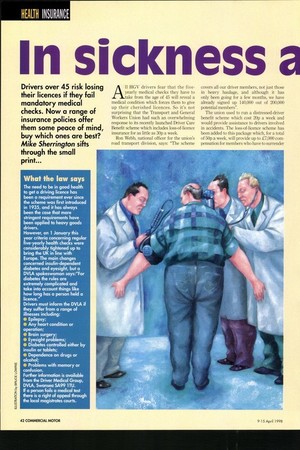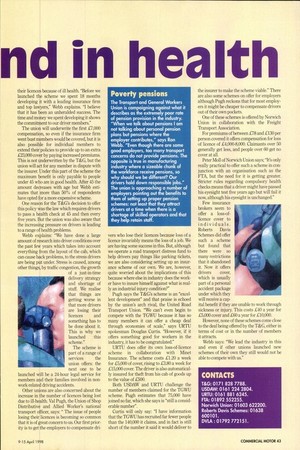n sickness a nd in hea th Drivers over 45
Page 44

Page 45

If you've noticed an error in this article please click here to report it so we can fix it.
risk losing their licences if they fail mandatory medical checks. Now a range of insurance policies offer them some peace of mind, buy which ones are best? Mike Sherrington sifts through the small print...
What the law says The need to be in good health to get a driving licence has been a requirement ever since the scheme was first introduced in 1935, and it has always been the case that more stringent requirements have been applied to heavy goods drivers.
However, on 1 January this year criteria concerning regular five-yearly _health checks were considerably tightened up to bring the UK in line with Europe. The main changes concerned insulin-dependent diabetes and eyesight, but a DVLA spokeswoman says:"For diabetes the rules are extremely complicated and take into account things like how long has a person held a licence.
Drivers must inform the DVLA if they suffer from a range of illnesses including: • Epilepsy; • Any heart condition or operation; • Brain surgery; It Eyesight problems; • Diabetes controlled either by insulin or tablets; • Dependence on drugs or alcohol; • Problems with memory or confusion.
Further information is available from the Driver Medical Group, DVLA, Swansea 5A99 ITU. If a person fails a medical test there is a right of appeal through the local magistrates courts. A„ HGV drivers fear that the fiveyearly medical checks they have to take from the age of 45 will reveal a medical condition which forces them to give up their cherished licences. So it's not surprising that the Transport and General Workers Union had such an overwhelming response to its recently launched Driver Care Benefit scheme which includes loss-of-licence insurance for as little as 30p a week.
Ron Webb, national officer for the union's road transport division, says: "The scheme covers all our driver members, not just those in heavy haulage, and although it has only been going for a few months, we have already signed up 140,000 out of 200,000 potential members".
The union used to run a distressed-driver benefit scheme which cost 20p a week and would provide assistance to drivers involved in accidents. The loss-of-licence scheme has been added to this package which, for a total of 50p a week, will provide up to £7,000 compensation for members who have to surrender their licences because of ill health. "Before we launched the scheme we spent 18 months developing it with a leading insurance firm and top lawyers," Webb explains. "I believe that it has been an unheralded success. The time and me ey we spent developing it shows the comm ent to our driver members."
The unio will underwrite the first £7,000 compensati n, so even if the insurance firm went bust m mbers would be covered, but it is also possi e for individual members to extend their policies to provide up to an extra £23,000 cov r by paying increased premiums. This is not nderwritten by the T&G, but the union will a t for any member in dispute with the insurer. nder this part of the scheme the maximum benefit is only payable to people under 45 who are in good health. After 45 the amount decreases with age but Webb estimates that more than 50% of respondents have opted flor a more expensive scheme.
One reasdn for the T&G's decision to offer this policy was the law which requires drivers to pass a health check at 45 and then every five years. But the union was also aware that the increasing pressure on drivers is leading to a range of health problems.
Other unions are also concerned about the increase in he number of licences being lost due to ill-he lth. Val Pugh, the Union of Shop Distributiv and Allied Worker's national transport o cer, says: "The issue of people losing their1 licences is becoming so common that it is of great concern to us. Our first priority is to get the employers to compensate di vers who lose their licences because loss of a licence invariably means the loss of a job. We are having some success in this. But, although we operate a road transport distress fund to help drivers pay things like parking tickets, we are also considering setting up an insurance scheme of our own. We are, however, quite worried about the implications of this because where else in industry does the worker have to insure himself against what is really an industrial injury condition?"
Pugh says the T&G's scheme is an "excellent development" and that praise is echoed by the union's arch rival, the United Road Transport Union. "We can't even begin to compete with the TGWU because it has so many members it can offer a cheap deal through economies of scale," says URTU spokesman Douglas Curtis. "However, if it offers something good for workers in the industry, it has to be congratulated."
URTU does offer its own loss-of-licence scheme in collaboration with Minet Insurance. The scheme costs £1.20 a week for £5,000 of cover, rising to £3.80 a week for £15,000 cover. The driver is also automatically insured for theft from his cab of goods up to the value of £500.
Both USDAW and URTU challenge the number of members claimed for the TGWU scheme. Pugh estimates that 75,000 have joined so far, which she says is "still a considerable number".
Curtis will only say: "I have information that the TGWU has recruited far fewer people than the 140,000 it claims, and in fact is still short of the number it said it would deliver to the insurer to make the scheme viable." There are also some schemes on offer for employers although Pugh reckons that for most employers it might be cheaper to compensate drivers out of their own pockets.
One of these schemes is offered by Norwich Union in collaboration with the Freight Transport Association.
For premiums of between £78 and £130 per person covered it offers compensation for loss of licence of £4,000-8,000. Claimants over 50 generally get less, and people over 60 get no cover at all.
Peter Moll of Norwich Union says; "It's only really practical to offer such a scheme in conjunction with an organisation such as the FTA, but the need for it is getting greater. Stricter rules regarding compulsory health checks means that a driver might have passed his eyesight test five years ago but will fail it now, although his eyesight is unchanged."
However, none of these schemes come close to the deal being offered by the T&G, either in terms of cost or in the number of members it attracts.
Webb says: "We lead the industry in this and even if other unions launched new schemes of their own they still would not be able to compete with us." Poverty pensions The Transport and General Workers Union is campaigning against what it describes as the extremely poor rate of pension provision in the industry. "When we talk about pensions I am not talking about personal pension plans but pensions where the employer contributes," says Ron Webb. "Even though there are some good employers, too many transport concerns do not provide pensions. The opposite is true in manufacturing industry where a sizeable chunk of the workforce receive pensions, so why should we be different? Our drivers hold down responsible jobs." The union is approaching a number of employers pointing out the benefits to them of setting up proper pension schemes: not least that they attract drivers at a time when there is a shortage of skilled operators and that they help retain staff.










































































































